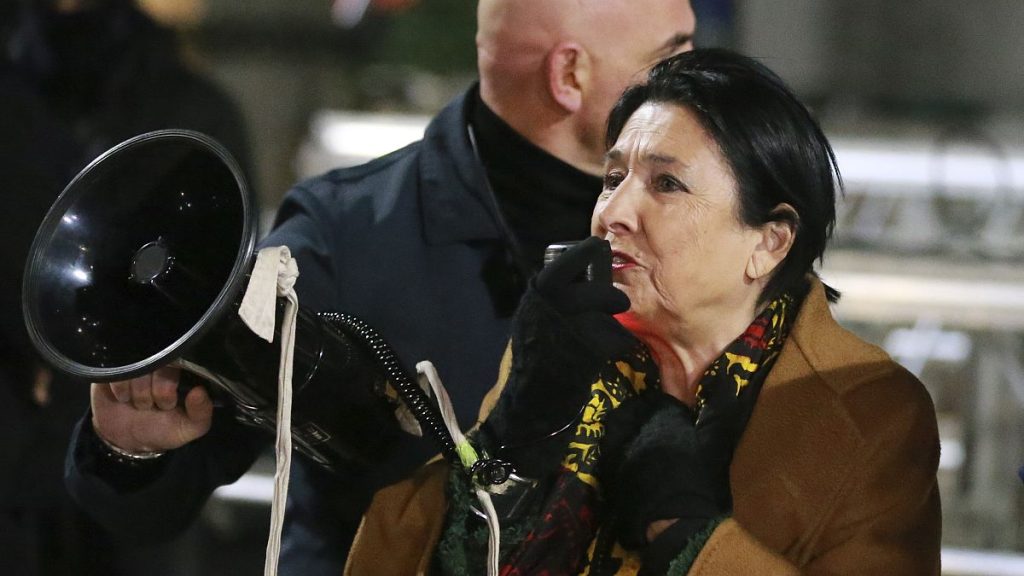Georgia’s Political Turmoil: A President Defiant, a Controversial Successor, and a Nation Divided
Georgia finds itself embroiled in a deepening political crisis, marked by a defiant outgoing president, a controversially elected successor, and widespread accusations of electoral manipulation and a pro-Russian tilt by the ruling party. At the heart of the storm is Salome Zourabichvili, whose six-year presidential term concludes amidst a backdrop of escalating tensions with the ruling Georgian Dream party. Zourabichvili has staunchly refused to recognize the legitimacy of the parliament and the subsequent election of Mikheil Kavelashvili as her successor. This act of defiance stems from her belief that the October parliamentary elections, which saw Georgian Dream retain power, were marred by irregularities and Russian interference. Zourabichvili’s stance has been bolstered by several opposition figures who share her suspicions about the election’s integrity.
Adding fuel to the fire is the controversial figure of Mikheil Kavelashvili, the former footballer turned politician who has been elected as Georgia’s new president. Kavelashvili’s political trajectory, marked by hardline anti-Western rhetoric and close ties to the ruling Georgian Dream party, has raised concerns among opposition groups and international observers. His election, viewed by many as a consolidation of Georgian Dream’s power and a shift away from the country’s European Union aspirations, has further deepened the political divide. The selection of Kavelashvili, a co-founder of the People’s Power movement known for its pro-Russian stance, has amplified fears about the country’s democratic trajectory. Zourabichvili has publicly denounced Kavelashvili’s election as a "mockery of democracy," reflecting the broader sentiment of discontent among those who see the process as illegitimate.
The controversy surrounding Kavelashvili is further compounded by his role in drafting a contentious law requiring organizations receiving significant foreign funding to register as "pursuing the interest of a foreign power." This law, reminiscent of similar legislation used in Russia to suppress dissent, has raised concerns about its potential impact on freedom of speech and civil society in Georgia. Kavelashvili’s association with this law has further cemented his image as a figure aligned with pro-Russian interests, exacerbating anxieties about the country’s political direction. The echoes of Russian influence in this legal maneuver have added another layer of complexity to the already fraught political landscape.
The political crisis in Georgia is intertwined with the country’s complex relationship with Russia and its aspirations for closer ties with the European Union. The disputed parliamentary elections and the subsequent selection of Kavelashvili have been interpreted by many as evidence of Georgian Dream’s increasing alignment with Moscow. This perceived pro-Russian tilt has further strained relations with the EU, with the bloc expressing concerns about democratic backsliding in Georgia. The postponement of EU accession talks until 2028, following a critical European Parliament resolution, underscores the growing divide between Georgia and the West. The resolution cited concerns about the fairness of the elections and the broader democratic trajectory of the country under Georgian Dream’s leadership.
The October parliamentary elections, which lie at the heart of the current crisis, have been marred by allegations of irregularities, including instances of violence, bribery, and double voting. International observers have documented these issues, prompting calls for a re-run of the elections from some EU lawmakers. These allegations, combined with the controversial "foreign influence" law, have cast a long shadow over Georgia’s democratic credentials and its relationship with the EU. The EU’s decision to grant Georgia candidate status in 2023 was conditional on the implementation of reforms aimed at strengthening democratic institutions and the rule of law. However, the recent developments have raised doubts about Georgia’s commitment to these reforms and its willingness to align with European values.
The political standoff in Georgia represents a critical juncture for the country. Zourabichvili’s defiance, Kavelashvili’s controversial election, and the broader allegations of electoral manipulation and Russian influence have created a climate of uncertainty and instability. The future direction of Georgia, its relationship with the EU, and the future of its democratic institutions hang in the balance. The international community is closely watching the unfolding events, with particular concern about the potential erosion of democratic norms and the increasing influence of Russia in the region. The ongoing crisis underscores the fragility of democratic progress and the challenges faced by countries navigating the complex geopolitical landscape of the 21st century.














